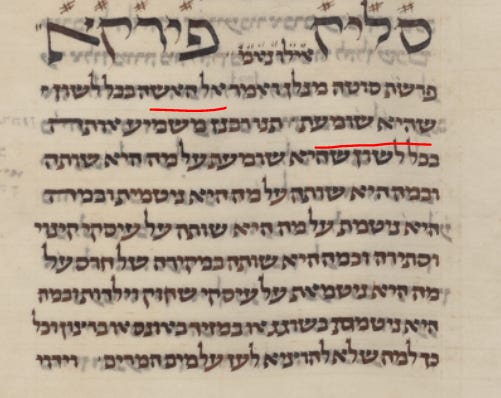In Any Language He Speaks?
I’ve submitted my Jewish Link article for this coming Shabbat, and it is called “In Their Language”. On this Substack, these articles are paywalled, so wait until around Thursday for the summary post and hyperlink.
That article focuses on a variant in the Mishnah, on 32a. Is it that the following texts may be recited בכל לשון or בלשונם. It seems Rashi weighs in on it, but that was due to a (meta-)girsological error in our Rashi texts. But Tosafot does weigh in, saying בלשונם because the implication in the gemara is that the woman must understand it. We cannot have the kohen recited to her in Persian when she is a Mede. And I connect it to the Yerushalmi and a dispute there between the Tannaim, Rabbi Yoshiya and Rabbi Yonatan, where it nonetheless seems all are in agreement that she must understand.
Now, the unusual situation of a follow-up to the post that will be available only later. On the next amud, Sotah 32b, the long Mishnah finally ends and we have the following gemara:
גְּמָ׳ פָּרָשַׁת סוֹטָה מְנָלַן? — דִּכְתִיב: ״וְאָמַר הַכֹּהֵן לָאִשָּׁה״ — בְּכׇל לָשׁוֹן שֶׁהוּא אוֹמֵר.
GEMARA: From where do we derive that the portion of the warning and the oath administered by the priest to a sota can be recited in any language? As it is written: “And the priest shall say to the woman” (Numbers 5:21), which indicates: In any language that he speaks.
תָּנוּ רַבָּנַן: מַשְׁמִיעִין אוֹתָהּ בְּכׇל לָשׁוֹן שֶׁהִיא שׁוֹמַעַת, עַל מָה הִיא שׁוֹתָה, וּבַמָּה הִיא שׁוֹתָה. עַל מָה נִטְמֵאת, וּבַמָּה הִיא נִטְמֵאת.
The Sages taught (Tosefta 2:1): The priest informs the sota in any language that she can hear and understand for what reason she must drink the bitter water of a sota, and from what vessel she will drink, on account of what actions she is considered to be defiled and in what way she defiled herself.
There seems to be a disconnect here between the Talmudic Narrator’s language — בְּכׇל לָשׁוֹן שֶׁהוּא אוֹמֵר, and the brayta’s language — בְּכׇל לָשׁוֹן שֶׁהִיא שׁוֹמַעַת, in terms of whether she must understand the non-Hebrew speech.
Rashi almost accidentally fixes the girsa for us. His concern is the derasha, and its source verse. He wants it to match the derivation from the Sifrei. He corrects the verse and in his continuation of his quotation of the gemara happens to quote it as שֶׁהִיא שׁוֹמַעַת. Thus:
גמ' ה"ג - ואמר אל האשה בכל לשון שהיא שומעת ומהאי קרא יליף לה בספרי ול"ג ואמר הכהן לאשה:
Looking at Hachi Garsinan, let us consider:
Vilna printing matching Venice printing in both the derasha from the pasuk, of ואמר הכהן לאשה as well as what everyone has for the next segment about viduy maaser, in any language that he understands, which for viduy maaser is the only sensible reading. The Bologna manuscript matches our printed texts.
Meanwhile, the Rostock manuscript has the derasha from the pasuk that Rashi wants, ואמר אל האשה, but keeps בכל לשון שהוא אומר.
Munich more or less matches Rashi in both the pasuk and the derivation, but has שהוא and שומע which seems masculine. Except that you can Biblically have הוא pronounced hi and שומע might be deemed a shorthand.
Vatican 110 has both variants that Rashi has, both the desired verse and “that she hears”.
I don’t think that the source pasuk needs to change. I’d point to the parallel Yerushalmi, that cites the same verse as our printed text.
That Yerushalmi reads:
אֵילּוּ נֶאֱמָרִין כול׳. כְּתִיב וְאָמַר הַכֹּהֵן לָאִשָּׁה. בְּכָל־לָשׁוֹן שֶׁהִיא שׁוֹמַעַת. דִּבְרֵי רִבִּי יֹאשִׁיָּה. אָמַר לֵיהּ רִבִּי יוֹנָתָן. וְאִם אֵינָהּ שׁוֹמַעַת וְלָמָּה הִיא עוֹנָה אַחֲרָיו אָמֵן. אֶלָּא שֶׁלֹּא יֹאמַר לָהּ עַל יְדֵי תּוּרְגְּמָן.
Rabbi Yoshiya employs the term בְּכָל־לָשׁוֹן, “in any language” but continues to qualify that as שֶׁהִיא שׁוֹמַעַת “that she understands”. Rabbi Yonatan responds that if she doesn’t understand, why is she saying Amen? Rather, the kohen has to say it to her directly, and not via a translator.
Rabbi Yonatan seems to work much better with the words וְאָמַר הַכֹּהֵן לָאִשָּׁה, which conveys a sense of directness, than Rashi’s alternative verse. Meanwhile, I suspect that שֶׁהִיא שׁוֹמַעַת may be original (other than the fact that the Talmudic Narrator might not have been precise). After all, it is matched by the next derasha about viduy maaser in any language, so dittography could have produced the wrong continuation.
More on this daf tomorrow…







